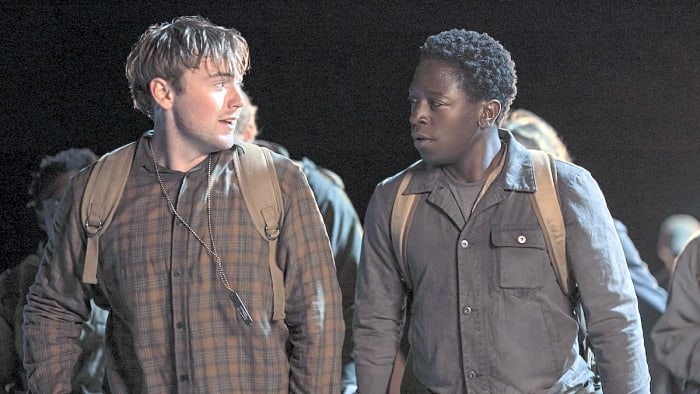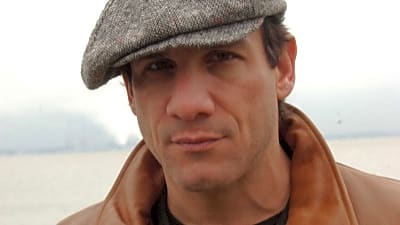
Whether you know nothing about The Long Walk or have read the novel, there’s a very good chance you’ll like director Francis Lawrence’s big screen adaptation. It’s an entertaining, troubling story that gets many of the book’s best and most important elements right. It’s gritty(ish), surprisingly gory, and genuinely funny. It also stays true to the novel’s very simple, straightforward plot. Young men living in a dystopian America voluntarily sign up for a yearly government competition where they must continuously walk without stopping until only one of them remains alive . The issue for readers is that while Lawrence made a movie worth seeing he turned a great Richard Bachman story into a good Stephen King one.
Richard Bachman was the pseudonym Stephen King published a handful of novels (he’d most written years earlier) under in the late ’70s into the mid ’80s. (That was the case until someone figured out the connection and ruined King’s fun.) But Bachman was more than just a name to the author. He was more like an alter ego who was different from himself in meaningful ways.
In his 1996 essay “The Importance of Being Bachman,” King described the state of mind in which he wrote the books he assigned to Bachman. He said he they were full of “low rage, sexual frustration, crazy good humor, and simmering despair.” Bachman stories also tended to be far, far bleaker than most King stories where the good guys generally win.
“Low rage, sexual frustration, crazy good humor, and simmering despair” is a perfect description for Bachman’s The Long Walk. It’s also—fortunately—a decent one for Lawrence’s movie. It takes place in a poor, desolate America still “recovering” from an internal war that tore it apart. There’s a lot to be angry about and little to be happy for. The country’s de facto leader, The Major (Mark Hamill) has deemed certain books and ideas illegal. It’s a perpetual fascist police state inside a never-ending Great Depression.
(By the end of the film, when I realized exactly what he was doing with the character, I loved Hamill’s performance. It seems like he’s doing caricature at first. But that’s because he plays the Major as a power hungry man who backed in to too much power and came to completely believe his own bulls---. He’s a monster full of real bravado that should be false. It’s a really smart, really good choice by Hamill, who is terrifying and hilarious.)

The movie ultimately works because despite its surreal setting and sinister story it’s characters feel real. These desperate, stupid, and brave young men feel and talk with an authenticity that provides the real horror in the story. They know all but one of them are going to die, and yet none of them seems to fully understand that fact until they find a gun pointed at their heads. And every time one does it makes you cringe and hope someone will somehow stop this terrible competition from continuing. You don’t want any of them to die.
Just like in the novel, The Long Walk gets us to invest in its nightmare by getting us to invest in these ill-fated characters, especially its main character Ray Garraty. Here he’s played by a very likable, sweet Cooper Hoffman. He’s easy to root for and you will. The same goes for his co-star David Jonsson. He plays Pete McVries, the story’s only optimistic character who befriends and protect Ray during the walk. These two anchor the film. Their relationship is also the source of the movie’s biggest change.

Lawrence and screenwriter JT Mollner seem to love the story of The Long Walk, but not its point-of-view. (For reasons I can’t really understand, they also cut or dramatically change some of the book’s most important characters.) Their version combines Bachman’s desolate, bleak yarn with the love and camaraderie of King works like Stand By Me and The Shawshank Redemption. That’s not necessarily a bad thing, obviously. Those are both classics for a reason. It’s just a different, less bold, less interesting version of The Long Walk than readers know.
That’s also because the movie gives the actual Long Walk contest a purpose that is missing from Bachman’s story. One of the best, most upsetting aspects of the book is that there’s no real justification for why this happens every year. The lack of a point has meaning in a story without hope. But in the movie, we’re told the competition inspires “hope” by literally getting people to work harder and increase the nation’s GDP. It serves a tangible purpose. That also makes the movie feel timely in a way that lessens its impact. (Though in total fairness, some think the novel is an analogy for the Vietnam War, so maybe Lawrence deserves credit for simply updating his to be timely in 2025.)

Movie Ray also has a very clear reason for joining, unlike his print counterpart who really isn’t sure why he volunteered. The subtext for Ray’s choice is one of the best parts of the book, but the film only nods at his internal struggles with his sexual identity. That change makes sense for the story the movie has decided to tell, but I couldn’t help but be disappointed by it.
There is real hope and beauty in this version of The Long Walk. There’s only darkness and pain in Bachman’s. That change in tone and point-of-view also necessitates a change (for the worst) in the ending, which is extremely funny. King is often accused of not knowing how to end his stories. Richard Bachman did. But because Lawrence and Mollner opted to tell a Stephen King-ified version of a Bachman story, they ran into a Stephen King problem.

There are worst things you can say about a movie than “this is a good Stephen King adaptation.” And that’s exactly what The Long Walk is. It made me laugh out loud just as often as it made me recoil in disgust and horror. Judy Greer who plays Ray’s mom also brought me to tears despite her very limited screen time. As did many of the walkers who only realized too late the horrible choice they’d made. I cared about these people, even the worst among them, because they were all victims. And they all felt all too real.
But while I really liked this film and think you should see it, as someone who absolutely loved the book, I can’t help but feel a little disappointed that a good Stephen King adaptation came at the expense of a great Richard Bachman story.
The Long Walk ⭐ (4 of 5)
The Long Walk hits theaters on September 12.
Mikey Walsh is a staff writer at Nerdist. He wants you to read The Long Walk and talk to him about it. You can follow him on Bluesky at @burgermike. And also anywhere someone is ranking the Targaryen kings.
More must-reads:
- The 20 most most memorable fictional U.S. Vice Presidents
- Michael Vlamis talks the layers of 'Pools,' finding his character, and the freedom of acting in new Yardbarker interview
Breaking News
Trending in Entertainment
Customize Your Newsletter
 +
+
Get the latest news and rumors, customized to your favorite sports and teams. Emailed daily. Always free!








